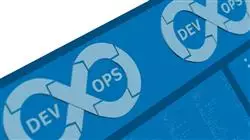University certificate
The world's largest faculty of information technology”
Introduction to the Program
With this program, you will master all the advanced practical solutions in software development"

Isolated teams, manual approaches and increasingly complex tools slow down innovation. Scaling DevOps practices is critical to accelerate the launch of high-quality digital services. The combination of approaches, practices and tools that help companies greatly accelerate the process of creating and implementing software could have a decisive impact on digital transformation.
That is why TECH has dedicated an entire program for specialization in DevOps and Software Quality, aimed at professionals seeking to optimize their results and achieve success in their processes. Developing a global and comprehensive view of the entire ecosystem, which allows us to identify the existing failure points during the development evaluation; as well as the importance of process automation to reduce human errors.
Therefore, graduates will be able to create and adapt the complete software delivery cycle according to specific needs, taking into account economic and security considerations. Developing the latest practices and tools in continuous integration and deployment, to selectively apply them in your future projects.
In the meantime, this program also contemplates the development of specialized knowledge on the design, elaboration and maintenance of a database in terms of standards and performance measures. To address data integrity protection and minimize data redundancy.
To make this possible, TECH Global University has gathered a group of experts in the area, who will transmit the most up-to-date knowledge and experience. Designed under the relearning methodology, which facilitates the memorization and learning of concepts in an agile and efficient way. Available for study from any device with an Internet connection. Obtaining the qualification in a maximum of 6 months.
The Postgraduate diploma analyzes the criteria underlying software quality. Broaden your expertise. Enroll now”
This Postgraduate diploma in DevOps and Software Quality contains the most complete and up-to-date program on the market. The most important features include:
- The development of case studies presented by experts in software development
- The graphic, schematic, and practical contents with which they are created, provide scientific and practical information on the disciplines that are essential for professional practice
- Practical exercises where self-assessment can be used to improve learning
- Its special emphasis on innovative methodologies
- Theoretical lessons, questions for experts and individual reflection work
- Content that is accessible from any fixed or portable device with an Internet connection
After this program, you will be able to implement DevOps correctly. Preparing for a successful software delivery cycle"
The program’s teaching staff includes professionals from the sector who contribute their work experience to this training program, as well as renowned specialists from leading societies and prestigious universities.
The multimedia content, developed with the latest educational technology, will provide the professional with situated and contextual learning, i.e., a simulated environment that will provide immersive training programmed to train in real situations.
This program is designed around Problem-Based Learning, whereby the professional must try to solve the different professional practice situations that arise during the academic year. For this purpose, the student will be assisted by an innovative interactive video system created by renowned and experienced experts.
Develop the latest practices and tools in continuous integration and deployment. Apply them selectively in your future projects"

Become an expert in 6 months, 100% online and with the most efficient methodology"
Syllabus
The contents of this Postgraduate diploma in DevOps and Software Quality are distinguished by their deep and specific development. Based on current events and with practical cases of real problems that allow students to go from unit to unit understanding the process of implementation of advanced solutions in software development, within the framework of the application of DevOps practices and continuous integration. Taking into account in the same sense the standardization and performance of the databases. For this purpose, different content formats are deployed through TECH Global University modern virtual campus.

You will learn to develop software with an evolvable life cycle, adapted to real needs"
Module 1. DevOps. Software Quality Management
1.1. DevOps. Software Quality Management
1.1.1. DevOps
1.1.2. DevOps and Software Quality
1.1.3. DevOps. Benefits of DevOps Culture
1.2. DevOps. Relation to Agile
1.2.1. Accelerated Delivery
1.2.2. Quality
1.2.3. Cost Reduction
1.3. DevOps Implementation
1.3.1. Problem identification
1.3.2. Implementation in a Company
1.3.3. Implementation Metrics
1.4. Software Delivery Cycle
1.4.1. Design Methods
1.4.2. Agreements
1.4.3. Roadmap
1.5. Error-Free Code Development
1.5.1. Maintainable Code
1.5.2. Development Patterns
1.5.3. Code Testing
1.5.4. Software Development at Code Level Good Practices
1.6. Automation
1.6.1. Automization Types of Tests
1.6.2. Cost of Automation and Maintenance
1.6.3. Automization Mitigating Errors
1.7. Deployment
1.7.1. Target Assessment
1.7.2. Design of an Automatic and Adapted Process
1.7.3. Feedback and Responsiveness
1.8. Incident Management
1.8.1. Incident Management
1.8.2. Incident Analysis and Resolution
1.8.3. How to Avoid Future Mistakes
1.9. Deployment Automation
1.9.1. Preparing for Automated Deployments
1.9.2. Assessment of the Health of the Automated Process
1.9.3. Metrics and Rollback Capability
1.10. Good Practices. Evolution of DevOps
1.10.1. Guide to Good DevOps Practices
1.10.2. DevOps. Methodology for the Team
1.10.3. Avoiding Niches
Module 2. DevOps and Continuous Integration. Advanced Practical Solutions in Software Development
2.1. Software Delivery Flow
2.1.1. Identification of Actors and Artifacts
2.1.2. Software Delivery Flow Design
2.1.3. Software Delivery Flow Inter-Stage Requirements
2.2. Process Automation
2.2.1. Continuous Integration
2.2.2. Continuous Deployment
2.2.3. Environment Configuration and Secret Management
2.3. Declarative Pipelines
2.3.1. Differences Between Traditional, Code-Like and Declarative Pipelines
2.3.2. Declarative Pipelines
2.3.3. Declarative Pipelines in Jenkins
2.3.4. Comparison of Continuous Integration Providers
2.4. Quality Gates and Enriched Feedback
2.4.1. Quality Gates
2.4.2. Quality Standards with Quality Gates. Maintenance
2.4.3. Business Requirements in Integration Requests
2.5. Artifact Management
2.5.1. Artifacts and Life Cycle
2.5.2. Artifact Storage and Management Systems
2.5.3. Security in Artifact Management
2.6. Continuous Deployment
2.6.1. Continuous Deployment as Containers
2.6.2. Continuous Deployment with PaaS
2.6.3. Continuous Deployment of Mobile Applications
2.7. Improving Pipeline Runtime: Static Analysis and Git Hooks
2.7.1. Static Analysis
2.7.2. Code Style Rules
2.7.3. Git Hooks and Unit Tests
2.7.4. The Impact of Infrastructure
2.8. Vulnerabilities in Containers
2.8.1. Vulnerabilities in Containers
2.8.2. Image Scanning
2.8.3. Periodic Reports and Alerts
Module 3. Database (DB) Design. Standardization and performance. Software Quality
3.1. Database Design
3.1.1. Databases. Typology
3.1.2. Databases Currently Used
3.1.2.1. Relationship
3.1.2.2. Key-Value
3.1.2.3. Based on Graphs
3.1.3. Data Quality
3.2. Entity-Relationship Model Design (I)
3.2.1. Entity-Relationship Model. Quality and Documentation
3.2.2. Entities
3.2.2.1. Strong Entity
3.2.2.2. Weak Entity
3.2.3. Attributes
3.2.4. Set of Relationships
3.2.4.1. 1 to 1
3.2.4.2. 1 to Many
3.2.4.3. Many to 1
3.2.4.4. Many to Many
3.2.5. Keys
3.2.5.1. Primary Key
3.2.5.2. Foreign Key
3.2.5.3. Weak Entity Primary Key
3.2.6. Restrictions
3.2.7. Cardinality
3.2.8. Heritage
3.2.9. Aggregation
3.3. Entity-Relationship Model (II). Tools
3.3.1. Entity-Relationship Model. Tools
3.3.2. Entity-Relationship Model. Practical Example
3.3.3. Feasible Entity-Relationship Model
3.3.3.1. Visual Sample
3.3.3.2. Sample in Table Representation
3.4. Database (DB) Standardization (I). Software Quality Considerations
3.4.1. DB Standardization and Quality
3.4.2. Dependency
3.4.2.1. Functional Dependence
3.4.2.2. Properties of Functional Dependence
3.4.2.3. Deduced Properties
3.4.3. Keys
3.5. Database (DB) Normalization (II). Normal Forms and Codd Rules
3.5.1. Normal Shapes
3.5.1.1. First Normal Form (1FN)
3.5.1.2. Second Normal Form (2FN)
3.5.1.3. Third Normal Form (3FN)
3.5.1.4. Boyce-Codd Normal Form (BCNF)
3.5.1.5. Fourth Normal Form (4FN)
3.5.1.6. Fifth Normal Form (5FN)
3.5.2. Codd’s Rules
3.5.2.1. Rule 1: Information
3.5.2.2. Rule 2: Guaranteed Access
3.5.2.3. Rule 3: Systematic Treatment of Null Values
3.5.2.4. Rule 4: Description of the Database
3.5.2.5. Rule 5: Integral Sub-Language
3.5.2.6. Rule 6: View Update
3.5.2.7. Rule 7: Insert and Update
3.5.2.8. Rule 8. Physical Independence
3.5.2.9. Rule 9: Logical Independence
3.5.2.10. Rule 10: Integrity Independence
3.5.2.10.1. Integrity Rules
3.5.2.11. Rule 11: Distribution
3.5.2.12. Rule 12: Non-Subversion
3.5.3. Practical Example
3.6. Data Warehouse/OLAP System
3.6.1. Data Warehouse
3.6.2. Fact Table
3.6.3. Dimension Table
3.6.4. Creation of the OLAP System. Tools
3.7. Database (DB) Performance
3.7.1. Index Optimization
3.7.2. Query Optimization
3.7.3. Table Partitioning
3.8. Simulation of Real Project for DB Design (I)
3.8.1. Project Overview (Company A)
3.8.2. Application of Database Design
3.8.3. Proposed Exercises
3.8.4. Proposed Exercises Feedback
3.9. Simulation of Real Project for BD Design (II)
3.9.1. Project Overview (Company B)
3.9.2. Application of Database Design
3.9.3. Proposed Exercises
3.9.4. Proposed Exercises Feedback
3.10. Relevance of DB Optimization to Software Quality
3.10.1. Design Optimization
3.10.2. Query Code Optimization
3.10.3. Stored Procedure Code Optimization
3.10.4. Influence of Triggers on Software Quality. Reccomendations for Use

A unique, key and decisive training experience to boost your professional development”
Postgraduate Diploma in DevOps and Software Quality
.
If you are looking to boost your career in the technology field, TECH Global University presents you with the Postgraduate Diploma in DevOps and Software Quality. In this cutting-edge educational program, you will acquire the knowledge and skills necessary to become a DevOps Postgraduate Diploma and ensure software quality in the most demanding technology projects. Our practical and up-to-date approach will allow you to stand out in the competitive world of technology and open doors to new career opportunities. One of the main advantages of our program is that all classes are taught online. This gives you the flexibility to study from anywhere and at any time that fits your schedule. The online classes give you access to quality, up-to-date content and interactive university courses that facilitate your learning and keep you up to date with the latest trends in DevOps and software quality.
Boost your career at TECH Global University.
.
During the program, you will learn best practices in continuous integration, continuous delivery and continuous deployment (CI/CD), test automation, configuration management and system monitoring. You will also become familiar with agile methodologies and learn to work in multidisciplinary teams to achieve optimal results in software development and release. Our faculty is composed of professionals with extensive industry experience, who will guide you through the program and share their practical knowledge so you can apply it to your career. This program gives you a competitive advantage in the job market and allows you to open new professional opportunities in leading companies in the technology sector. Don't miss this opportunity to boost your career in the world of technology. Enroll in TECH Global University's Postgraduate Diploma in DevOps and Software Quality and benefit from our state-of-the-art online classes. The future of your career is within your reach!







